
Vishakha Mahajan
(Ph.D. in Health Sciences (Molecular Biology), MSc. Reproductive and Developmental Biology, BSc. Biological Sciences and Health Policy Administration)
If you are just joining we suggest reading Amino Acids and Their Importance Across Life stages (Part 1).
In this article we will look more closely how low or inadequate intake of protein, and essential amino acids, especially over longer periods of time can lead to cognitive impairment.
This is particularly important for our ageing population and seniors whose need for protein is increasing with each year passed.
Amino acids and Ageing
Advances in research and an enhanced understanding of nutrition highlight the importance of protein-rich foods on cognitive function. The gap between the recommended daily allowance (0.8 g/kg/day) and the level of protein intake needed for optimal health, further emphasizes the importance of a high protein diet.
Moreover, in the context of longevity and ageing, elderly adults over the age of 65 are recommended a protein intake between 1.2 and 2.0 g/kg/day or higher.[1]
Several factors, including the loss of muscle mass due to sarcopenia and the reduced ability of muscles to effectively respond to dietary protein (anabolic resistance), necessitate a higher protein intake to support healthy body function.[2]
Adults 65 years and older need to increase their protein intake to at least 1.2 g/kg daily
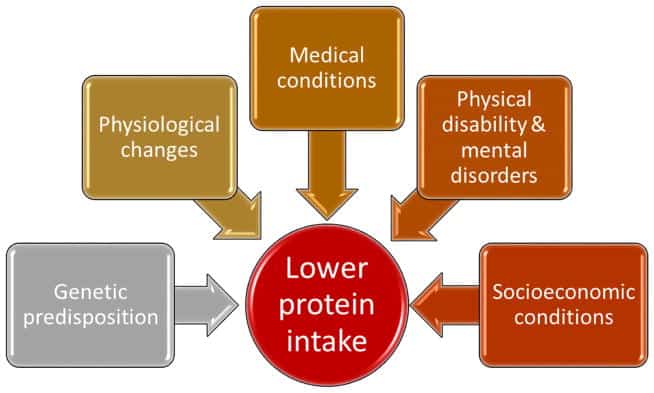
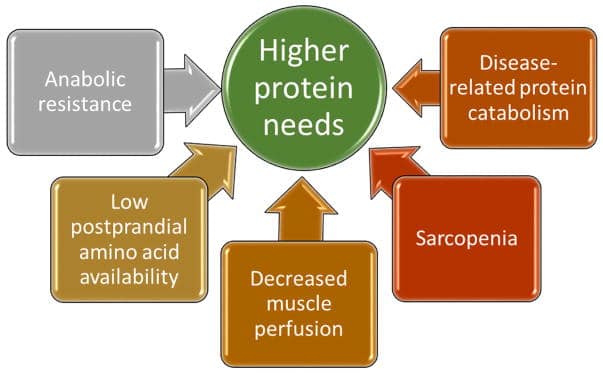
Preliminary studies in aged-mice models have indicated that a low protein diet reduces the concentrations of amino acids and neurotransmitters in the plasma and brain, subsequently contributing to cognitive dysfunction.[3]
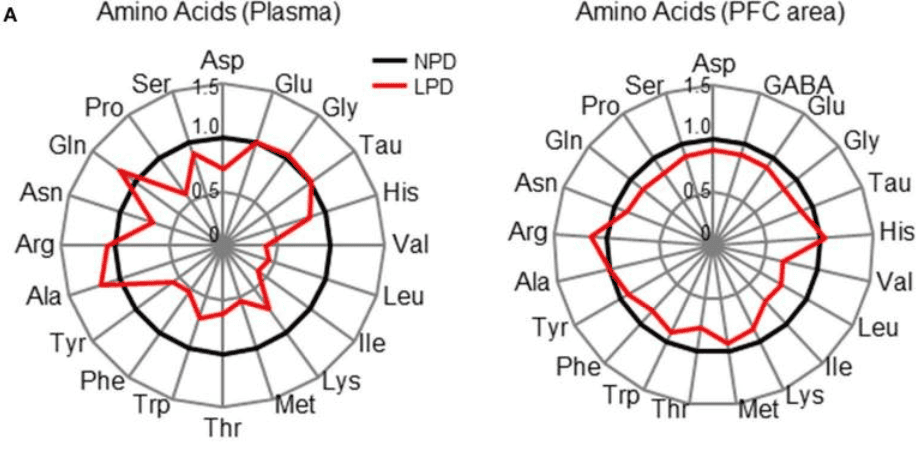
Neurotransmitters like dopamine, norepinephrine and serotonin were significantly reduced in mice who were on a low protein diet (LPD) in comparison to those who were fed a normal protein diet (NPD).[3]
Moreover, the addition of seven essential amino acids to the low protein arm (LPD) ameliorated these changes in neurotransmitters as demonstrated below in red.
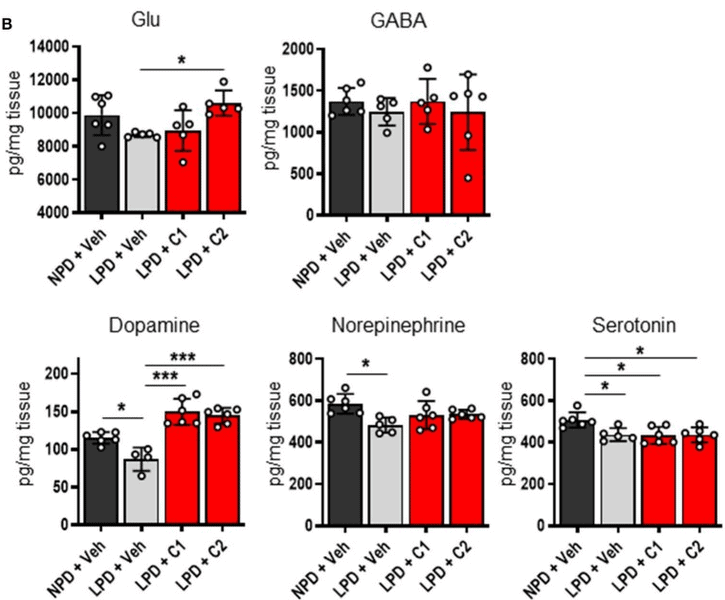
Additionally, a follow-up study by the same group explored the effects of a low protein diet in neurodegenerative conditions. Low protein status has been associated with cerebral atrophy that is often seen in conditions such as dementia and Alzheimer’s disease.
Low protein intake has been associated with cerebral atrophy
Subsequently, using dementia mice models, it was concluded that mice on a low protein diet have approximately 30% more of cerebral atrophy.
Whereas those on a low protein diet, but supplemented with amino acids, exhibited no or suppressed cerebral atrophy.[4]
Overall these preliminary studies suggest the importance of protein intake in diet for maintaining brain function, especially in the ageing population.
RELATED — What are Amino Acids and what is their role in keeping us healthy?
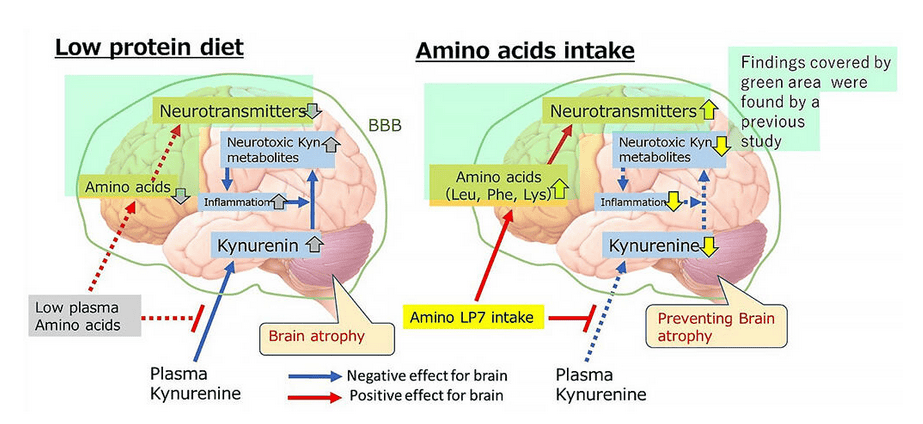
Further, the same group conducted a human intervention study looking at cognitive function in middle-aged and older people with a predisposition to dementia, evaluating the impact of orally consuming a mixture of seven essential amino acids, which were
- leucine
- phenylalanine
- lysine
- isoleucine
- histidine
- valine
- tryptophan
and concluded improved attention, cognitive flexibility and psychosocial functioning.[5]
Insufficient intake of amino acids and neurodegenerative diseases
Neurodegenerative conditions such as
- Dementia
- Alzheimer’s disease (AD)
- Mild cognitive impairment (MCI)
are strongly associated with reduced levels of essential amino acids in the blood.
A study evaluating 68,032 participants from the UK biobank, reports that blood levels of isoleucine, leucine and valine, are associated with an increased risk of dementia and Alzheimer’s disease.
The study further suggests a protective effect of these 3 amino acids on dementia and Alzheimer’s disease.[6] These findings were also corroborated by another study investigating the baseline amino acid profile of participants with mild cognitive impairment and their susceptibility to develop Alzheimer’s Disease.
The group that developed Alzheimer’s Disease, as depicted in the image below, exhibited lower concentrations of EAA (leucine, isoleucine, valine and histidine) in comparison to those patients with mild cognitive impairment, who did not develop the disease.[7]
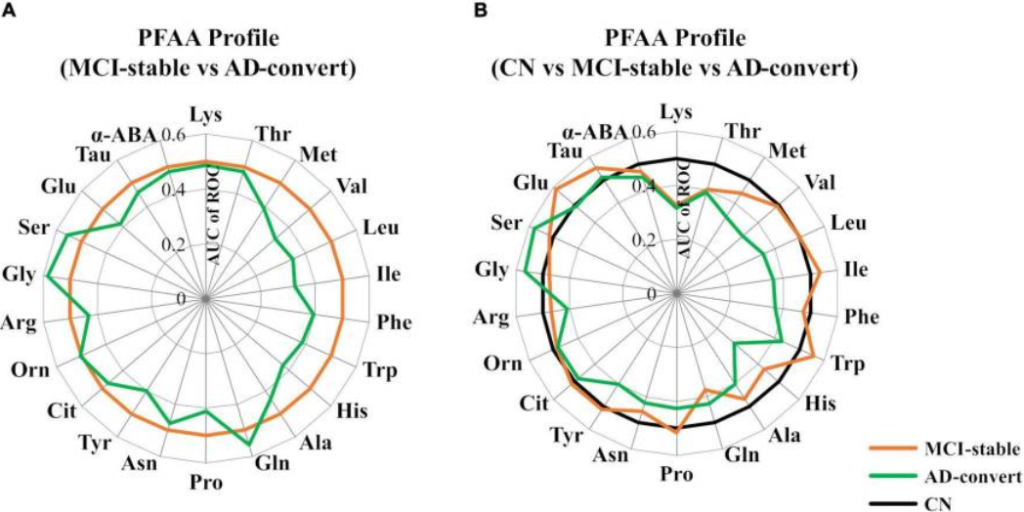
An imbalance in neurotransmitters like dopamine, serotonin, and norepinephrine is linked to conditions such as depression, schizophrenia, and Parkinson’s disease.
Low intake of essential amino acids leads to cognitive impairment
In a study involving 1383 older and 341 younger adults, habitual dietary tyrosine intake, a precursor for neurotransmitter production, positively influenced cognitive functions such as working memory, episodic memory, and fluid intelligence across both age groups.[8]
In a different study, the concentrations of amino acids in 219 elderly individuals with mild cognitive impairment and 220 individuals with normal cognition, were compared.
The findings suggest that the concentration of albumin, lysine and histidine were lower in the mild cognitive impairment group. Further, drawing an association between mild cognitive impairment importance of protein nutrition with age.[9]
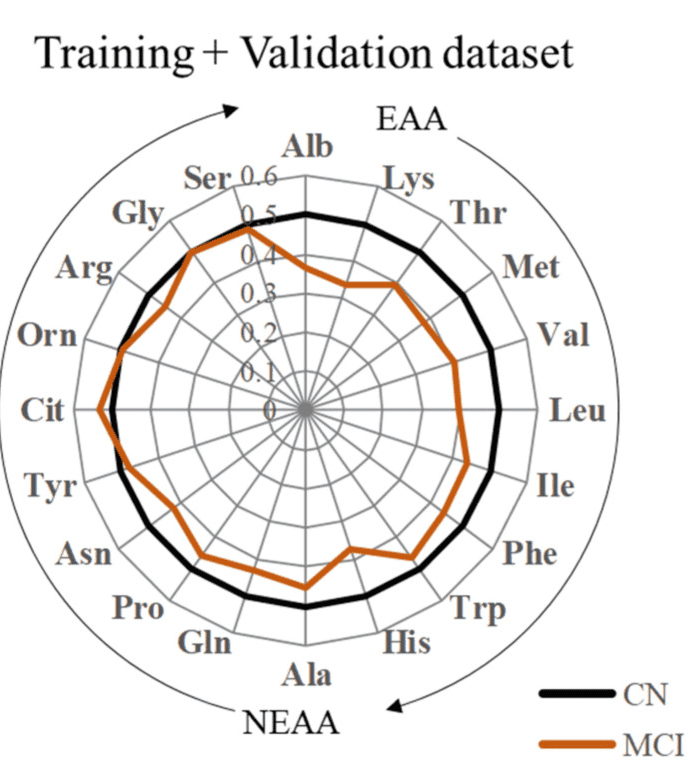
Collectively, these findings and studies indicate the importance of EAA in the diet and the potential of food-based interventions for patients with neurodegenerative diseases. Amongst a range of functions, amino acids also support brain health by
- assisting neuronal regeneration
- assisting neurotransmission
- slowing apoptosis
They promote nerve cell growth and counter damage from hypoxia or toxins, with potential as treatments for neurological disorders.[10]
Conclusion
Neurological conditions affect approximately 15% of the global population and are the leading cause of disability and death, worldwide.
Dietary interventions, particularly adequate protein intake, play a crucial role in preserving brain health and combatting symptoms of brain ageing.
Amino acids, the building blocks of proteins, support critical functions from fetal development to ageing, including muscle growth, immune function, mood regulation, and cognitive health. A balanced, varied diet ensures a full spectrum of amino acids, promoting overall growth, development, and well-being across all life stages.
References
(1) Baum JI, Kim IY, Wolfe RR, Reynolds DW. Protein Consumption and the Elderly: What Is the Optimal Level of Intake? 2016 [cited 2024 Jun 17]; Available from: www.mdpi.com/journal/nutrients
(2) Deutz N, Bauer J, Barazzoni R, Biolo G, Boirie Y, & Bosy-Westphal A, Cederholm T, Cruz-Jentoft A, Krznarić Z, Nair K, Singer P, Teta D, Tipton K, Calder P. (2014). Protein intake and exercise for optimal muscle function with aging: Recommendations from the ESPEN Expert Group. Clinical nutrition (Edinburgh, Scotland). 33. 10.1016/j.clnu.2014.04.007.
(3) Sato H, Tsukamoto-Yasui M, Takado Y, Kawasaki N, Matsunaga K, Ueno S, et al. Protein Deficiency-Induced Behavioral Abnormalities and Neurotransmitter Loss in Aged Mice Are Ameliorated by Essential Amino Acids. Front Nutr. 2020 Mar 11;7. https://pmc.ncbi.nlm.nih.gov/articles/PMC7079559/
(4) Sato H, Takado Y, Toyoda S, Tsukamoto-Yasui M, Minatohara K, Takuwa H, et al. Neurodegenerative processes accelerated by protein malnutrition and decelerated by essential amino acids in a tauopathy mouse model. Sci Adv. 2021 Oct 22;7(43):eabd5046.
(5) Suzuki H, Yamashiro D, Ogawa S, Kobayashi M, Cho D, Iizuka A, et al. Intake of Seven Essential Amino Acids Improves Cognitive Function and Psychological and Social Function in Middle-Aged and Older Adults: A Double-Blind, Randomized, Placebo-Controlled Trial. Front Nutr. 2020 Nov 25;7.
(6) Fu Y, Wang Y, Ren H, Guo X, Han L. Branched-chain amino acids and the risks of dementia, Alzheimer’s disease, and Parkinson’s disease. Front Aging Neurosci. 2024 Apr 10;16. https://www.frontiersin.org/journals/aging-neuroscience/articles/10.3389/fnagi.2024.1369493/full
(7) Ikeuchi T, Kanda M, Kitamura H, Morikawa F, Toru S, Nishimura C, et al. Decreased circulating branched-chain amino acids are associated with development of Alzheimer’s disease in elderly individuals with mild cognitive impairment. Front Nutr. 2022 Dec 14;9. https://pmc.ncbi.nlm.nih.gov/articles/PMC9794986/
(8) Kühn S, Düzel S, Colzato L, Norman K, Gallinat J, Brandmaier AM, et al. Food for thought: association between dietary tyrosine and cognitive performance in younger and older adults. Psychol Res. 2019 Sep;83(6):1097–106.
(9) Ikeuchi T, Yano Y, Sato W, Morikawa F, Toru S, Nishimura C, et al. Development of a Novel Nutrition-Related Multivariate Biomarker for Mild Cognitive Impairment Based on the Plasma Free Amino Acid Profile. Nutrients. 2022 Feb 1;14(3). https://pmc.ncbi.nlm.nih.gov/articles/PMC8840028/
(10) Rajagopal S, Sangam SR, Singh S, Joginapally VR. Modulatory Effects of Dietary Amino Acids on Neurodegenerative Diseases. In 2016. p. 401–14.






